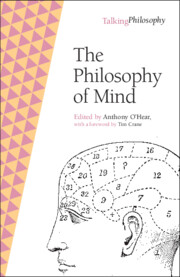Book contents
- The Philosophy of Mind
- Talking Philosophy
- The Philosophy of Mind
- Copyright page
- Contents
- Foreword
- List of Contributors
- Introduction
- The Mind–Body Problem after Fifty Years
- How to Find the Neural Correlate of Consciousness
- Embodiment and the Philosophy of Mind
- Folk Psychology and Mental Simulation
- Understanding Other Minds from the Inside
- Self-knowledge: the Wittgensteinian Legacy
- Joint Attention and the First Person
- Consciousness as Existence
- Setting Things before the Mind
- Perceptual Intentionality, Attention and Consciousness
- Experience and Reason in Perception
- Intentionality as the Mark of the Mental
- Intentionality and Interpretation
- Externalism and Norms
- Mind, World and Value
- Mind, Knowledge and Reality: Themes from Kant
- The Modality of Freedom
- Dualism in Action
- Index
Understanding Other Minds from the Inside
Published online by Cambridge University Press: 19 May 2022
- The Philosophy of Mind
- Talking Philosophy
- The Philosophy of Mind
- Copyright page
- Contents
- Foreword
- List of Contributors
- Introduction
- The Mind–Body Problem after Fifty Years
- How to Find the Neural Correlate of Consciousness
- Embodiment and the Philosophy of Mind
- Folk Psychology and Mental Simulation
- Understanding Other Minds from the Inside
- Self-knowledge: the Wittgensteinian Legacy
- Joint Attention and the First Person
- Consciousness as Existence
- Setting Things before the Mind
- Perceptual Intentionality, Attention and Consciousness
- Experience and Reason in Perception
- Intentionality as the Mark of the Mental
- Intentionality and Interpretation
- Externalism and Norms
- Mind, World and Value
- Mind, Knowledge and Reality: Themes from Kant
- The Modality of Freedom
- Dualism in Action
- Index
Summary
Can we understand other minds ‘from the inside’? What would this mean? There is an attraction which many have felt in the idea that creatures with minds, people (and perhaps animals), invite a kind of understanding which inanimate objects such as rocks, plants and machines, do not invite and that it is appropriate to seek to understand them ‘from the inside’. What I hope to do in this paper is to introduce and defend one version of the so-called ‘simulation’ approach to our grasp and use of psychological concepts, a version which gives central importance to the idea of shared rationality, and in so doing to tease out and defend one strand in the complex of ideas which finds expression in this mysterious phrase.
- Type
- Chapter
- Information
- The Philosophy of Mind , pp. 128 - 155Publisher: Cambridge University PressPrint publication year: 2022

